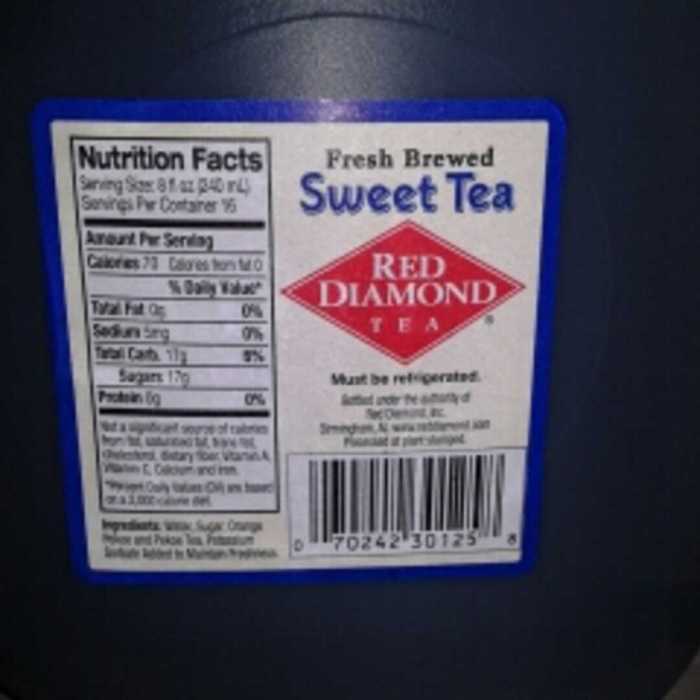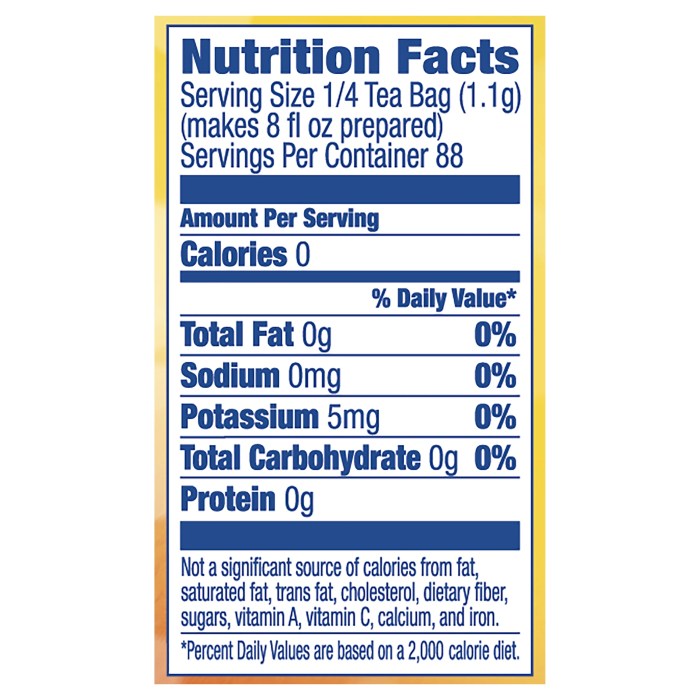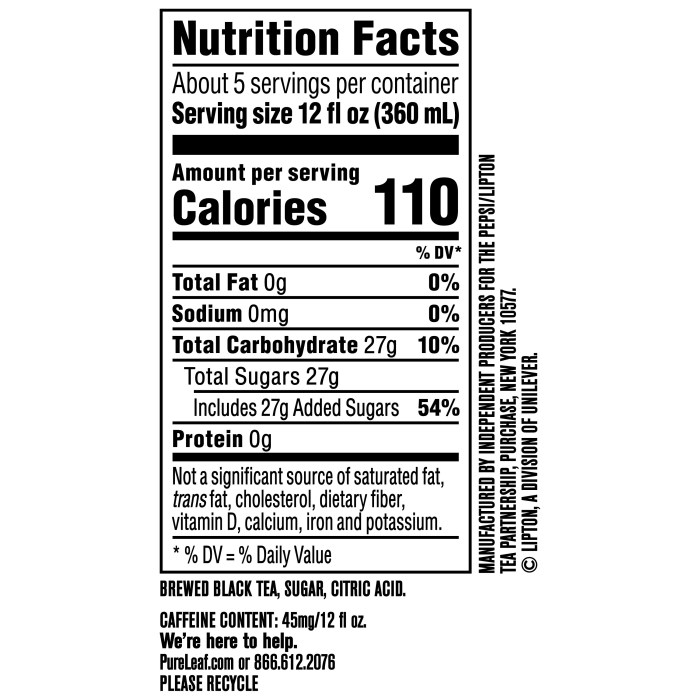Caloric Breakdown of 30 oz Sweet Tea
Nutrition facts for 30 oz sweet tea – Right, so let’s get down to brass tacks and dissect the calorific content of a 30oz sweet tea, shall we? It’s a bit of a beast, this one, and understanding its nutritional profile is key to maintaining a balanced diet. We’re talking a serious sugary beverage here, so expect some hefty numbers.The main caloric contributors are, unsurprisingly, the sugar and any added flavourings.
The water itself is calorie-free, obviously. A typical 30oz sweet tea, depending on the brand and recipe, could contain anywhere between 400-600 calories, with the vast majority – probably 90% or more – stemming from added sugar. This sugar is often in the form of high-fructose corn syrup or sucrose, both potent sources of empty calories. Any additional ingredients, like lemon or other flavourings, contribute minimally to the overall calorie count.
Calorie Count Compared to Daily Intake
A 30oz sweet tea’s calorie content represents a significant portion of the recommended daily caloric intake for most adults. The recommended daily calorie intake varies based on factors like age, sex, activity level, and overall health, but generally ranges from 2000 to 2500 calories for adult women and 2500 to 3000 for adult men. Consuming a single 30oz sweet tea could easily account for 15-25% of a person’s daily calorie needs, leaving little room for other, more nutritious foods.
Think of it this way: that’s the equivalent of several meals, all packed into one sugary drink.
Visual Representation of Caloric Breakdown
Imagine a pie chart. The largest slice, dominating the chart, would represent the calories from sugar, perhaps taking up 85-95% of the pie. A tiny sliver would represent the negligible caloric contribution from any other added ingredients like lemon juice or flavourings. The remaining sliver, also small, would be the near-zero calorie contribution of the water itself.
This visual clearly demonstrates the overwhelming dominance of sugar in contributing to the overall calorie count of this beverage. The stark contrast highlights the need for moderation.
Nutritional Content Beyond Sugar and Calories

Right, so we’ve crunched the numbers on the sugar and calorie content of that mega-sized sweet tea. But let’s not betotally* shallow, shall we? There’s more to this sugary nectar than just empty calories. Let’s delve into the (admittedly limited) nutritional landscape of our 30oz behemoth. Think of it as a bit of a nutritional autopsy – we’re looking for any surviving vitamins or minerals clinging on for dear life amidst the sugar rush.Beyond the sugar bomb, the nutritional profile of sweet tea is, shall we say, a bit underwhelming.
Essentially, you’re getting a concentrated dose of sugar and, depending on the tea type, trace amounts of other compounds. The sheer volume of sugar overshadows any potential nutritional benefits from other ingredients. It’s a bit like trying to find a single Smartie in a bag of Haribo – the sheer volume of the other stuff makes it a near impossible task.
Vitamins and Minerals in Sweet Tea
The presence of vitamins and minerals in sweet tea is heavily dependent on the type of tea used and whether any additional ingredients are added beyond sugar and water. Generally speaking, however, the contribution of vitamins and minerals from a 30oz serving of sweet tea is negligible. We’re talking about minuscule amounts, if any at all.
- Vitamin C: Some teas, particularly green tea, contain small amounts of Vitamin C. However, this is likely to be significantly reduced or destroyed during the brewing and sweetening process. The amount in a 30oz sweet tea would be practically insignificant.
- Minerals: Tea leaves do contain trace amounts of minerals like potassium, manganese, and fluoride. Again, the quantities are likely to be extremely low in a heavily sugared, large volume drink and are unlikely to contribute meaningfully to your daily intake.
- Antioxidants: Tea, especially green and black tea, contains antioxidants. However, the addition of large amounts of sugar may negate some of these potential benefits.
In short, while a cup of plain tea might offer some minor nutritional benefits, a 30oz sugary sweet tea is essentially a calorie and sugar delivery system, with any other nutritional contribution being utterly negligible from a health perspective. Don’t rely on this beverage to hit your daily vitamin targets, that’s for sure.
Impact on Health Conditions

Right, so let’s get down to brass tacks. We’ve covered the sugar content of that mega-sized sweet tea, but now we need to delve into the potential impact on your bod. Regularly guzzling 30oz of the sugary stuff can have some pretty serious knock-on effects, and it’s not all sunshine and roses, I’m afraid. We’re talking about a significant sugar load, and that’s a major player in a whole host of health issues.High sugar intake, as you’d expect, plays a blinder in contributing to various health problems.
The mechanisms are complex, but essentially, it all boils down to the body’s response to excess glucose. This can lead to insulin resistance, inflammation, and oxidative stress – all pretty nasty things. Let’s look at some specific examples.
Diabetes Risk, Nutrition facts for 30 oz sweet tea
Chronic consumption of high-sugar drinks like this sweet tea significantly increases the risk of developing type 2 diabetes. The constant influx of sugar overwhelms the body’s ability to regulate blood glucose levels, leading to chronically elevated blood sugar. Over time, this can damage vital organs like the pancreas, heart, and kidneys. Consider this: studies have shown a strong correlation between the consumption of sugary drinks and the incidence of type 2 diabetes, with individuals who regularly consume these beverages having a significantly increased risk compared to those who don’t.
Let’s face it, the nutrition facts for 30 oz of sweet tea are hardly a beacon of health. That massive sugar load? A stark contrast to the mineral-rich profile you’ll find when you explore the benefits of Himalayan pink salt – check out the detailed breakdown at frontier pink himalayan salt nutrition facts to see what I mean.
Understanding the stark difference highlights the importance of mindful choices; remember, even small swaps can make a big impact on your overall well-being, so let’s make better choices than that 30 oz sweet tea!
Weight Management Challenges
It’s a no-brainer, really. Those extra calories from the sugar in the sweet tea contribute directly to weight gain. Liquid calories are particularly insidious because they don’t trigger the same satiety signals as solid food. You might feel full after a burger, but that 30oz of sweet tea? It’s just empty calories that contribute to your daily energy balance, leading to a positive energy balance and weight gain.
This can increase the risk of obesity and related health problems such as cardiovascular disease and certain cancers. Think of it like this: a 30oz sweet tea might contain the equivalent of several slices of cake in terms of sugar and calories, without the feeling of fullness.
Dental Health Deterioration
Sugary drinks are absolute murder on your teeth. The sugar feeds the bacteria in your mouth, producing acids that erode tooth enamel, leading to cavities and gum disease. The high sugar content combined with the prolonged contact of the liquid with your teeth increases the risk of dental problems exponentially. Regular consumption of sugary drinks, especially without proper oral hygiene, sets the scene for a whole host of dental issues, requiring costly dental interventions.
This is especially true for those already prone to cavities or gum disease.
Recommendations for Individuals with Health Concerns
Individuals with diabetes, those watching their weight, or those with pre-existing dental issues should severely limit or completely avoid sugary drinks like this sweet tea. For those with diabetes, it’s crucial to manage blood glucose levels carefully, and sugary drinks can significantly hinder those efforts. For those trying to manage their weight, cutting out sugary drinks is a great place to start.
And for those with dental problems, reducing sugar intake is essential to protect their teeth. Substituting this sweet tea with water, unsweetened tea, or other low-sugar alternatives is a much healthier choice.
Ingredients and Additives: Nutrition Facts For 30 Oz Sweet Tea

Right, so let’s delve into the nitty-gritty of what’s actuallyin* that gargantuan 30oz sweet tea. It’s not just sugar and water, you know. Commercially produced sweet teas often contain a cocktail of ingredients and additives designed to enhance flavour, colour, and shelf life. Understanding these components is key to grasping their potential impact on your bod.It’s a bit of a minefield, really.
Many of these additives are perfectly safe in moderation, but excessive consumption, especially over a prolonged period, can have knock-on effects. We’re talking about stuff that might not immediately make you keel over, but could contribute to long-term health issues if you’re not careful. Think of it like this: a single dodgy sausage probably won’t kill you, but a diet consisting solely of dodgy sausages…
well, let’s just say it wouldn’t be ideal.
Common Additives in Commercially Prepared Sweet Tea
A typical 30oz sweet tea might contain a surprising array of ingredients beyond the obvious sugar and tea leaves. These are often added to improve the drink’s taste, appearance, and preservation.
| Additive | Purpose | Potential Health Implications |
|---|---|---|
| High-fructose corn syrup (HFCS) | Sweetener; cheaper alternative to sugar. | Linked to increased risk of weight gain, type 2 diabetes, and metabolic syndrome. Excessive consumption can lead to liver problems. Studies suggest it may be metabolised differently to sucrose, potentially impacting insulin response. |
| Artificial sweeteners (e.g., aspartame, sucralose) | Sweetener; calorie-free alternatives. | While generally considered safe within acceptable daily intake levels, some individuals report side effects like headaches or digestive issues. Long-term health effects are still being researched. Some studies suggest potential links to certain health issues, but more research is needed. |
| Citric acid | Acidulant; adds tartness and acts as a preservative. | Generally considered safe. However, high acidity can erode tooth enamel. |
| Artificial colours (e.g., Yellow 5, Red 40) | Enhances visual appeal. | Some artificial colours have been linked to hyperactivity in children and allergic reactions in susceptible individuals. Long-term effects are not fully understood. |
| Preservatives (e.g., sodium benzoate, potassium sorbate) | Extends shelf life. | Generally considered safe in low concentrations. However, some studies suggest potential links to certain health problems at high levels of consumption. Interaction with other substances is also a consideration. |
| Natural flavours | Enhances taste. | Can be a mixture of various natural extracts and compounds. The exact composition may vary and is often not fully disclosed. |
Popular Questions
What are the artificial sweeteners sometimes found in 30 oz sweet teas?
Common artificial sweeteners include aspartame, sucralose, and saccharin. However, their presence varies greatly between brands.
Does the type of tea (black, green, etc.) significantly impact the nutritional profile of a 30 oz sweetened version?
The type of tea base has a minor impact; the overwhelming influence on nutritional content comes from the added sugar.
Are there any long-term health risks associated with consuming large amounts of sweet tea regularly?
Yes, regular consumption of large amounts of sweet tea can increase the risk of weight gain, type 2 diabetes, tooth decay, and other health problems due to the high sugar content.
